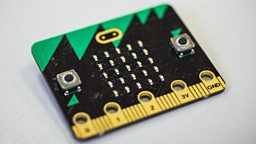

The BBC has confirmed that its Micro Bit computer will be available to a global audience thanks to the creation of a new non-profit organisation called the Micro Bit Educational Foundation.
The Micro Bit is designed to help teach school children simple coding skills and its roll out was severely delayed last year. That said, roughly one million of the devices were given away free to UK-based schoolchildren (aged 11 and 12) earlier this year.
The BBC has now announced that the Micro Bit will be sold worldwide, and that enthusiasts would be offered blueprints to allow them to build their own versions.
To this end the BBC has created a new non-profit foundation, and it confirmed that while the Micro Bit is already in use in schools in the UK, the Netherlands, and Iceland, it intends to further its global footprint to Europe by the end of this year, and then North America and China in 2017.
And it seems that the foundation is already developing Norwegian and Dutch-language versions of its coding web tools to boost demand.
“That means [selling] tens of millions of devices… over the next five to 10 years.”
Shelby also confirmed that the Micro bit will be upgraded in 2017 with new components.
“We will be putting more computing power in,” Shelby reportedly said. “We will be looking at new types of sensors. And also how to display Chinese and Japanese characters – it turns out you need a lot more LEDs than we have today.”
“We also have work to do to reduce the price for developing countries, that’s something we’re very aware of,” he added.
It should be remembered that the original BBC Micro was a State-backed £200 educational computer build by Acorn Computers for the BBC. It was launched back in 1981 and sold 1.5 million units. It was credited with getting a generation of schoolchildren and others interested in computer programming.
The new BBC Micro Bit computer on the other hand is pocket sized and costs just £13. Like its older model, the new Micro Bit is also designed for a new generation schoolchildren, especially girls, to help them develop their digital and coding skills.
The BBC had worked with 29 partners on the project including, ARM, Microsoft, Samsung, Barclays and Lancaster University. Other organisations such as Cisco, Code Club and Teen Tech, have also provided educational resources.
The Micro Bit’s design was finalised in July 2015, which saw the removal of a slot for a thin battery, which many felt would compromise its appeal as a wearable device. One of its possible applications in the early days was for it to be pinned to a child’s clothing.
The Micro Bit was also badly delayed. In September the BBC confirmed that a power supply problem meant it would only be dispatched “after Christmas”. In January this year it was delayed yet again.
The Micro Bit computer competes against a number of rival devices, although to be fair, it is being pitched as a complementary device, rather than a competitor, to the Raspberry Pi and other micro computers.
Do you know how many raspberries are used in the making of a Raspberry Pi? Take our quiz!
OpenAI chief operating officer Brad Lightcap to oversee international expansion as company consolidates lead in…
Chinese researchers publish details on device that could wreak havoc on undersea communications cables in…
Former Intel chief Gelsinger expands role at Gloo, becoming executive chairman and head of technology…
MEPs add to Commission pressure for second EU Chips Act amidst industry calls for renewed…
Smartphone maker Xiaomi reportedly raises about $5.5bn in Hong Kong share sale as it invests…
BYD's Qin L EV sedan starts at about half the price of Tesla's Model 3,…